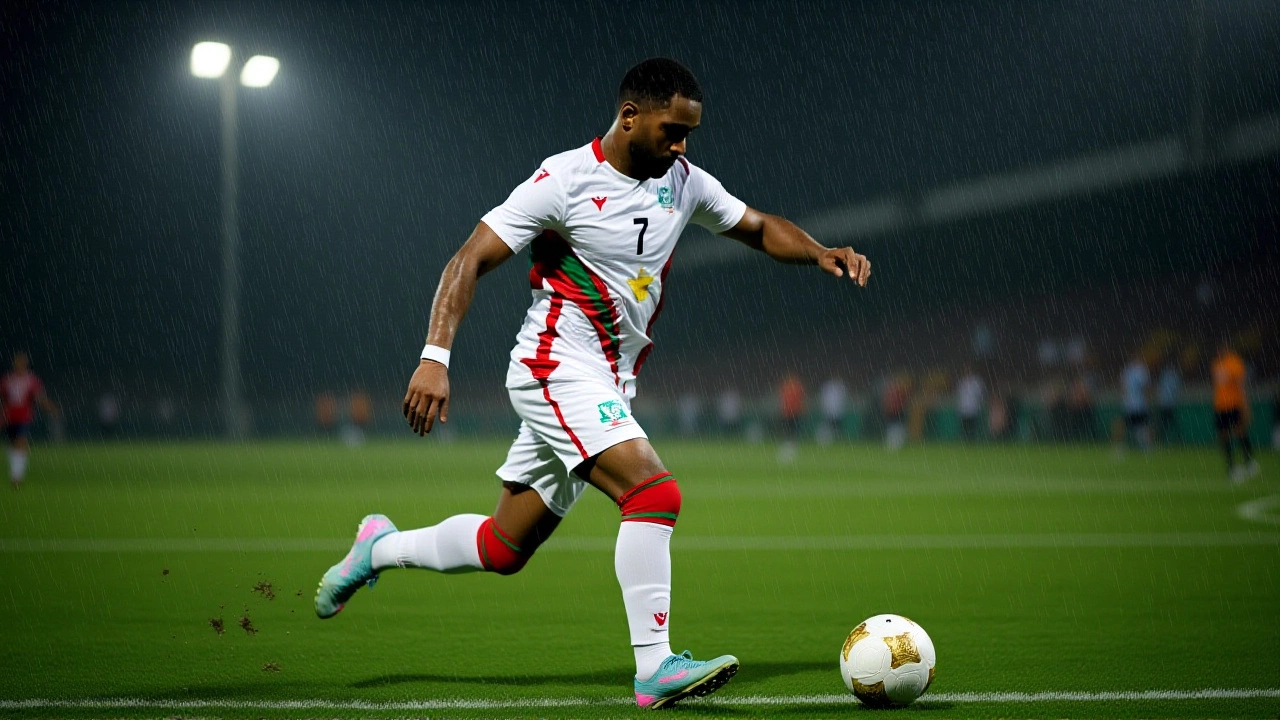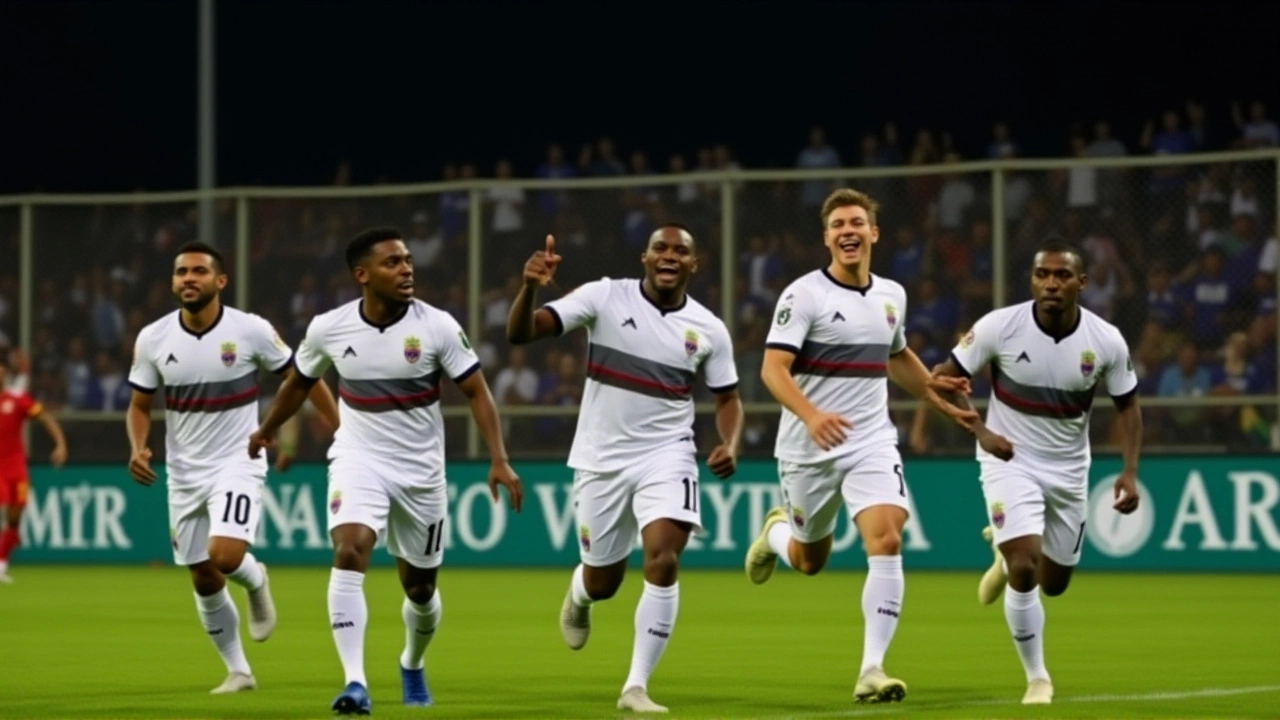On a humid Thursday night in Paramaribo, Suriname didn’t just beat El Salvador — they rewrote their own history. A 4-0 thrashing at Franklin Essed Stadium on November 13, 2025, left the Caribbean-South American nation one victory away from qualifying for their first-ever FIFA World Cup Canada, Mexico, and the United States. The scoreline wasn’t just impressive — it was seismic. For a country that’s never made it past the qualifiers, this wasn’t just a win. It was a declaration.
From Underdogs to Contenders
Suriname’s rise in Concacaf qualifying has been quiet but relentless. Before this match, they sat atop Group A with 9 points from five games — unbeaten, unbroken, and utterly unexpected. El Salvador, by contrast, entered the match with just three points and a -6 goal difference. Their last World Cup appearance? 1982. Suriname’s? Never. Not once. Not even close.
The first goal came at 44’, when El Salvador’s Julio Sibrian tripped a Surinamese attacker inside the box. The referee didn’t hesitate. Penalty. And who stepped up? Tjaronn Chery, the 31-year-old midfielder wearing number 10, whose career has spanned clubs from the Netherlands to Qatar. He didn’t just score — he buried it. A low, hard drive into the near post. No celebration. Just a nod. Like he’d done this a hundred times before.
The Margaret Magic
Then came Richonell Margaret. A 23-year-old forward who barely played for his club last season, now the hero of Paramaribo. At 74’, a wild deflection off a Salvadorian defender sent the ball straight to his feet. One touch. One shot. Goal. Two minutes later, left-back Ricigociano Haps slipped a low cross from the endline — the kind you see in training, not in World Cup qualifying. El Salvador’s keeper, caught off-guard, didn’t move. Margaret pounced again. 3-0. The stadium exploded.
The fourth goal, though not fully documented, arrived shortly after. No fan remembers who scored. They only remember the roar. The noise wasn’t just joy — it was decades of frustration, colonial legacy, and forgotten dreams finally breaking free.
Who’s Behind the Scenes?
Suriname’s manager? No one knows his name. Not officially. CBS Sports Golazo America called him "an international manager for now six different nations," but didn’t name him. That’s not unusual in Surinamese football — a small nation, limited resources, a coach who’s flown under the radar. Yet his tactics were flawless. Compact defense. Fast transitions. Ruthless efficiency.
On the pitch, Benji Villalobos in goal, Isaac Portillo at center-back, and Tomas Romero in midfield held firm. El Salvador’s stars — Brayan Gil, Darwin Cerén — were ghosted. No spark. No rhythm. Just confusion.

The Road Ahead
Now, Suriname faces Guatemala on the road on November 18, 2025. A win or a draw seals their place in the FIFA World Cup Canada, Mexico, and the United States. A loss? They’re still alive — but the pressure skyrockets.
Current Group A standings tell the story: Suriname (9 pts), Panama (6 pts), Guatemala (5 pts), El Salvador (3 pts). Suriname’s +5 goal difference is the best in the group. They’ve drawn three times — and now, they’ve won two. No losses. That’s not luck. That’s discipline.
Why This Matters
Suriname’s population? Just 600,000. Smaller than many U.S. cities. Their national team has never played in a World Cup. Not in 1970. Not in 1994. Not in 2010. Not in 2022. But now? They’re one game away. And they’re not just hoping. They’re ready.
This isn’t just about football. It’s about identity. Suriname was once Dutch Guiana. Its people speak Dutch, Sranan Tongo, Hindi, Javanese. Its football culture is a patchwork of colonial history and Caribbean soul. To qualify for the World Cup would mean the world — literally — to a nation that’s spent decades being overlooked.
And then there’s the Netherlands. Suriname’s former colonizer. The Dutch team is already qualified for 2026. Imagine if Suriname joins them. A small nation, on the edge of South America, sharing the same stage as the giants they once served. That’s poetry.

What’s Next?
The final qualifying match is on November 18. If Suriname holds Guatemala to a draw, they’re in. If they win? They’ll be the smallest nation ever to qualify from Concacaf in the modern era. The broadcast teams are already calling it "the miracle of Paramaribo."
And if they fall short? They’ll still have the satisfaction of having come closer than ever before. But no one in Suriname is thinking about that. Not now. Not with the World Cup just one game away.
Frequently Asked Questions
How did Suriname go from never qualifying to being one win away from the World Cup?
Suriname’s rise is the result of consistent, disciplined play over the last two qualifying cycles. After years of struggling in early rounds, they’ve built a core of players with European club experience — like Tjaronn Chery and Richonell Margaret — who bring tactical maturity. Their unbeaten record (2W, 3D) in this round, coupled with a +5 goal difference, shows remarkable stability. They’ve learned to grind out results, even when not dominant.
Why is this match against Guatemala so critical?
Guatemala sits just four points behind Suriname, with a game in hand. A win for Guatemala would tie them on points, but Suriname’s superior goal difference gives them the edge. A draw still sends Suriname to the World Cup. But a loss? That forces a playoff scenario, which would be a nightmare for a team that’s never played in one. The pressure is immense — but so is the opportunity.
Has any team from Suriname ever played in a World Cup before?
No. Suriname has never qualified for a FIFA World Cup since its inception in 1930. They’ve come close — notably in 1986, when they lost a playoff to Honduras — but never made it. This is their first time in the final round of Concacaf qualifying since 2000. Their 4-0 win over El Salvador marks their largest margin of victory in World Cup qualifying history.
What role does the Dutch connection play in Suriname’s football success?
Suriname’s football infrastructure is deeply tied to the Netherlands. Many players are born in the Netherlands to Surinamese parents and choose to represent Suriname. Tjaronn Chery, for example, played for Dutch clubs like Heracles and FC Utrecht before switching allegiance. The Dutch football system has provided training, exposure, and pathways that Suriname’s domestic league couldn’t. This transnational talent pipeline is what’s making the difference.
How does this result impact El Salvador’s chances?
El Salvador’s hopes are all but gone. With just 3 points from 5 games and a -6 goal difference, they’re mathematically eliminated from direct qualification. Their final match against Panama on November 18 won’t matter for World Cup dreams — only pride. Their last World Cup appearance was in 1982, and unless they overhaul their entire system, another 40-year wait is likely.
What’s the significance of the Franklin Essed Stadium in this historic moment?
Franklin Essed Stadium, home to Suriname’s national team since 1976, has never hosted a World Cup qualifier with this much at stake. Its 7,500-seat capacity is modest, but on November 13, it was packed with fans waving Surinamese flags and singing in Sranan Tongo. For the first time, the stadium felt like a fortress — not just a venue. The noise, the pride, the history — it all converged here. This match will be remembered as the night Suriname stopped dreaming and started believing.
